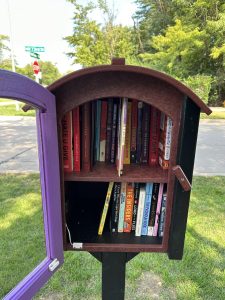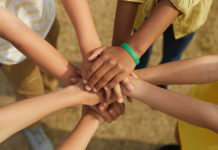
We have been reading to our children since the day they came into our world. The importance of reading to your children evolves as they grow, but the basic reason is the same: To help them grow.
Reading broadens perspectives, inspires imagination, and opens our minds. A new law, SF 496, was passed in Iowa to put restrictions on school libraries for students in kindergarten through 12 grade.
It is still unclear what books this will affect, but so far there is a long list in consideration. In Florida, one librarian pulled all of their books in fear of being fired or worse, prosecuted, for having the wrong books on their shelves. The problem is, what is “appropriate” is subjective. We rely on the expertise of certified librarians and educators to make those decisions. If you don’t like a book your child has access to in school, there are already processes in place to have it removed. Simply put, just put the book back on the shelf. Removing the book entirely means no child gets access to that book.
 Banned books are valuable to incorporate in your home library for many reasons, especially now that they will not be accessible at Iowa’s school libraries. In response to the passing of this law, my family installed a Little Free Library on our property in Johnston, which will focus on providing banned books to the community. You can follow our little library on Facebook here.
Banned books are valuable to incorporate in your home library for many reasons, especially now that they will not be accessible at Iowa’s school libraries. In response to the passing of this law, my family installed a Little Free Library on our property in Johnston, which will focus on providing banned books to the community. You can follow our little library on Facebook here.
What is a banned book?
There is a debate over what is considered a banned book. The American Library Association defines a book challenge as an attempt to remove or restrict materials, based upon the objections of a person or group. A book banning is the removal of those materials. This includes removal from any public space including a library, school library, classroom, etc.
The National Coalition Against Censorship wrote a very informative kids’ book going over everything about banned books. It’s titled, “A Kids Book About Banned Books.” It is a great overview not only for kids, but adults too! Simply put, if a book is removed from public space that is a banned book.
Teachers and librarians can help provide context for a child when they are reading books. Since this law has removed this access, our household is working to ensure our kids are still immersed in diverse topics so they can grow to be empathetic and critical thinkers.
4 Reasons to Read Banned Books with Your Kids
Understand new perspectives
According to PEN American, 874 book titles were banned from schools in the United States in the first half of the 2022-2023 school year. The contents of those books were on subjects containing characters of color or from the LGBTQ+ community. In addition to books considered the canon of children’s literature, we add books to introduce our children to diverse perspectives and help them understand the complexities of the world.
Encourage critical thinking
Banned books are frequently targeted due to unconventional ideas. By engaging with these controversial texts, you provide an opportunity for your children to develop critical thinking skills. As they encounter conflicting viewpoints and navigate moral dilemmas within the pages of banned books, they learn to analyze, question, and form their own opinions. This practice cultivates independent thinking, empowering them to make informed decisions in the face of opposition.
Foster open communication
When you explore sensitive topics within the safe space of a book, children are more likely to open up and express their thoughts. Whether it’s discussing censorship, discrimination, or the complexities of human nature, these conversations build trust, encourage active listening, and provide opportunities for you to guide your children’s understanding of the world.
to open up and express their thoughts. Whether it’s discussing censorship, discrimination, or the complexities of human nature, these conversations build trust, encourage active listening, and provide opportunities for you to guide your children’s understanding of the world.
Teach the value of freedom
Finally, when you explain to a child why a book is banned it is a great way to teach your children about the importance of freedom of expression and the dangers of censorship. Discussing the historical and cultural context surrounding these banned books helps children understand the significance of protecting the right to read and think independently. By empowering them with knowledge, you equip them to become advocates for intellectual freedom.
Take a literary adventure with your kids through the pages of a banned book (any book that has been removed from public spaces).
















